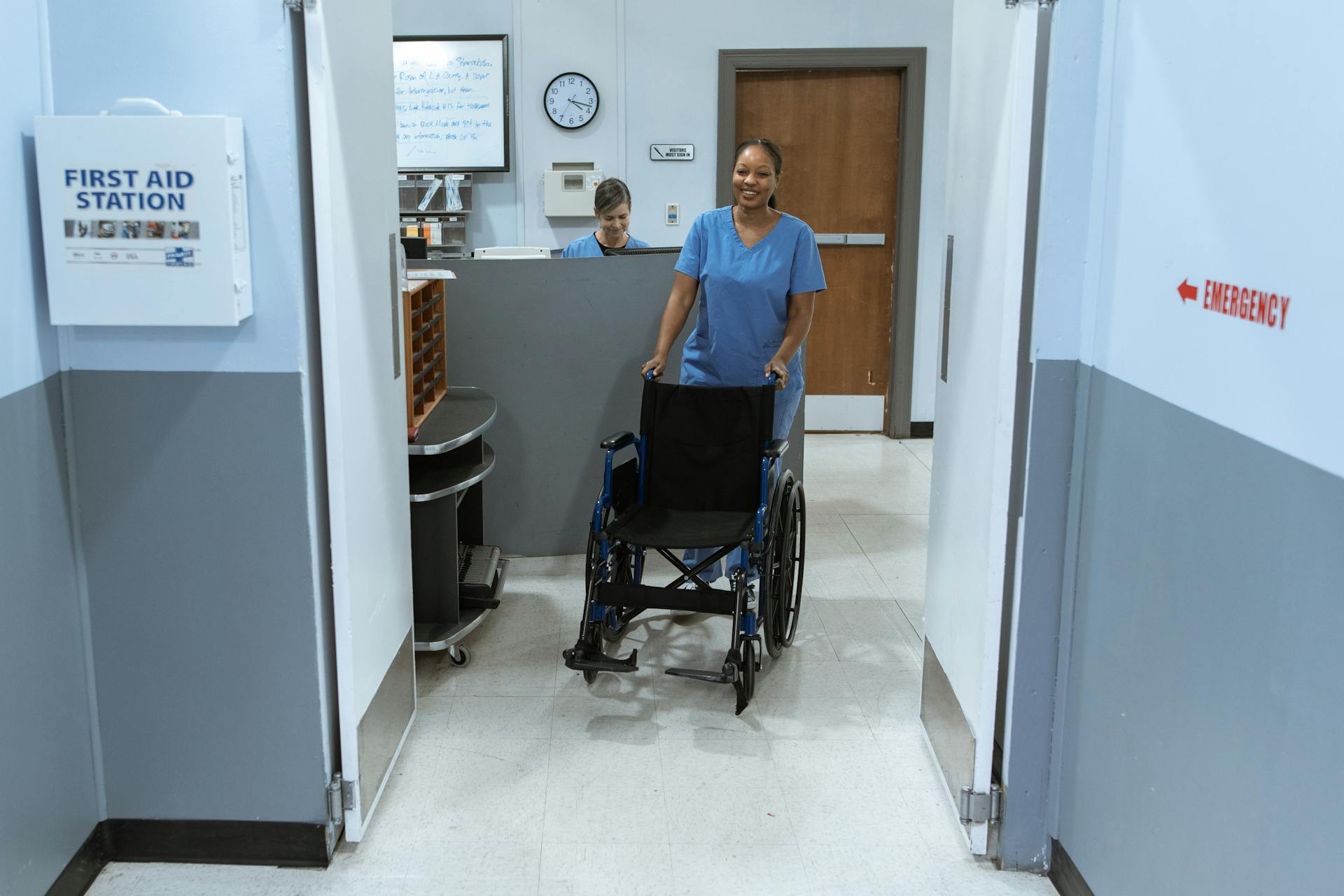
How Does Travel Nursing Work? Requirements, Pros and Cons & Salary

Transitioning from full-time staff to travel nursing is a big leap. You’re probably wondering, “How does travel nursing work?” Landing has the answers.
Exploring different cities and learning from new colleagues and work environments is an exciting job perk in any profession. But for registered nurses, hopping from one hospital to another softens the demanding routine of a high-stress, fast-paced job.
Americans move in record numbers in response to the COVID-19 pandemic, creating a new surge in demand for medical facilities across the country — and nurses are among the most sought after roles. The Bureau of Labor Services projects that nearly 200,000 new registered nursing positions will open annually through 2032. While hospitals and clinics deal with labor shortages, they turn to travel nurses to fill in essential positions.
You’re probably wondering, “How does travel nursing work?” After all, contract-based work presents unique challenges to your career and lifestyle. Here’s our guide to travel nursing, including information about finding travel nursing positions, accommodations, and salaries.
What is a Travel Nurse?
A travel nurse is a registered nurse who works temporarily for a hospital, clinic, or other healthcare facility. Hospitals seek out travel nurses for a number of reasons, including being short-staffed, filling in during busy seasons, or replacing a nurse on leave.
For nurses who want to break up their routine and travel while making competitive pay and great benefits, travel nursing is an incredible opportunity. Plus, they can work locally, nationally, or internationally.
How Does Travel Nursing Work?
Travel nurses perform the same duties as full-time staffed registered nurses like attending to patients and briefing doctors. But there are a few nuances. Here’s what to expect:
1. Daily Routine
It’s hard to define how much travel nurses work because every job contract is unique. If you become a travel nurse, you’ll likely have the same shifts and responsibilities attending patients alongside other staff nurses.
However, many hospitals and clinics offer cross-training opportunities, letting travel nurses learn by rotating through related units experiencing critical staff shortages. A critical care nurse might perform duties on the postanesthesia or telemetry care units. These opportunities let nurses add a line to their resume while learning about new departments.
2. Nurse Staffing Agencies
As a travel nurse, you can choose to work as an independent contractor or for a travel nursing agency. Most opt to work with a staffing agency to simplify the job hunting process, helping you find the right job position in your dream destination, secure stipends, and prepare contracts or necessary paperwork.
If you’re working independently, you’ll need to find your own contracts and figure out how to file taxes as a contractor. Make sure you’ve done thorough research before committing to the solo route.
3. Job Benefits
Travel nurses who work with staffing agencies usually receive benefits packages despite being on contracts. Benefits may include healthcare options — including dental, and life insurance — or housing stipends, and even licensure aid to bring on talent. Every agency is different, so consider several agencies and what they offer to find the right fit.
4. Short Contracts
Every job contract is different, but contracts typically last between 2–3 months. However, it’s not uncommon to find job opportunities that last a few weeks or longer than 12 weeks.
5. Travel Nurse Requirements
According to the American Nurses Association (ANA), travel nurses need to be licensed RNs with an undergraduate nursing degree, like an Associate’s degree in Nursing or a Bachelor’s of Science in Nursing. They also need to pass the NCLEX-RN exam and have the same common certifications as any other kind of staffed nurse, like Basic Life Support and Advanced Cardiovascular Life Support. Travel nurses are also required to have clinical experience, meaning you’ll need to spend time working as an RN before applying for travel nursing positions.
If you choose a job in another state or country, you’ll need a local license. Most agencies help you secure the appropriate nursing licenses.
How Much Do Travel Nurses Earn?
Travel nurses earn an average of $101,132 annually, according to a 2024 analysis by ZipRecruiter. The report identified 12 states with average annual salary offerings above the national average:
- New York, $120,132
- Pennsylvania, $110,003
- New Hampshire, $107,568
- New Jersey, $105,937
- Wyoming, $104,792
- Washington, $104,650
- Wisconsin, $103,900
- Massachusetts, $103,897
- Alaska, $103,624
- Oregon, $102,785
- Indiana, $102,621
- North Dakota, $102,597
Analyzing state averages is a good starting point for understanding basic salary expectations. However, regional demands, seasonal fluctuations, and nursing specialties and experience affect your salary offering. Keep in mind that these are annual numbers, too, and you might have a shorter contract.
Where to live as a travel nurse
A medical facility may offer high salaries when they’re in a pinch to fill a role, especially if it’s a specialized nursing position. High salaries may also reflect a higher cost of living. Before accepting any contract, research expenses like rent, utilities, and transport against your salary package to make sure you’ll be making enough.
If you need help finding a starting point, consider these five cities with high-paying travel nursing jobs:
San Francisco, California
A laid-back urban center with a unique arts and food scene, proximity to wine country, and access to nature make San Francisco an appealing temporary home. The average salary doesn’t hurt either. Travel nurses in San Francisco make an average of $3,258 per week, which is 26% higher than the California average.
Cary, North Carolina
Located just outside North Carolina’s capital city of Raleigh, Cary is a quiet suburb with plenty of metropolitan perks. The average salary is $2,981 per week. That’s 35% higher than the North Carolina average.
El Paso, Texas
The Texas border town is in high demand for registered nurses, with an average travel nurse salary of $2,011 per week. This is 9% higher than the average for similar positions across Texas.
Philadelphia, Pennsylvania
The quintessential American city has a little bit of everything: rich history, dedicated sports fans, and great food. An average salary of $2,151 per week in Philadelphia, which is widely considered an affordable city compared to other east coast metropolitan areas.
Bellevue, Nebraska
Although chilly winters aren’t ideal for everyone, Bellevue is a quiet suburb full of green spaces ideal for outdoorsy adventurers. The average travel nurse salary in Bellevue is $2,585 per week, higher than the national average.

Pros and Cons of Travel Nursing
Constant change is a double-edged sword, and travel nursing is full of new experiences and steep learning curves. Here are a few pros and cons to weigh out before signing on.
3 Pros of Travel Nursing
Imagine being able to take a summer assignment near the beach or hit the slopes during the winter. That’s the life of a travel nurse changing contracts throughout the year — like digital nomads choosing to work from anywhere. Here are three more benefits:
1. Makes Your Job Interesting
It’s common for travel nurses to fill positions in different units or job roles. For professionals who feel dragged down by routine, rotating travel nurse assignments helps maintain the thrill of the job.
2. Schedule Breaks Between Contracts
As a contractor, you don’t have to abide by the typical two-week vacation. You’re free to plan time off between contracts, whether you want to vacation in a far-away destination or take time off to be with your family. Your job revolves around your lifestyle, not the other way around.
3. Enhances Your Resume
Adaptability, time management, and cultural competency are just a few soft skills that a travel nursing career puts to the test. But you can also choose jobs that teach you about new nursing specialties. For example, seeking positions in a public health outreach program to develop patient advocacy skills could make you a better candidate for a future role.
3 Cons of Travel Nursing
For some, embracing flexible living is easier said than done. Here are three cons to carefully consider:
1. Missed Expectations
Even with careful research and thoughtful interview questions, your questions could fail to reveal red flags about a workplace. Constantly transitioning into new healthcare facilities increases the risk of landing in less-than-ideal work environments, including poor communication among coworkers, bad management styles, or unexpected workloads due to staff shortages.
2. New Places Can Feel Isolating
It isn’t easy to be away from your trusted support network. And if you don’t vibe with the local lifestyle or work culture, travel nursing assignments can feel extremely isolating. Resilience and flexibility are essential skills to turn tough situations into valuable learning opportunities.
3. Lots of Logistical Planning
For many, moving is one of life’s most stressful events. Travel nursing might mean moving several times a year. And getting the correct licensures, negotiating salaries, and settling into a new home is exhausting. Without the right support and mindset, the stress might outweigh the excitement of exploring a new place.
How Does Housing Work for Travel Nursing?
Where travel nurses stay during assignments varies between contracts and nursing agency policies. Typically, nursing agencies provide a housing stipend within your compensation package to cover housing costs, and some agencies might have partnerships with rental companies to help you find the right home.
If you’re in need of a new place in a new city, check out Landing’s nomad packing checklist and digital nomad advice to know what amenities to ask for. And if you’re lucky, you might be able to snag a Landing rental wherever your next contract is based.
Find Your Perfect Stay with Landing
Just because you’re on a temporary assignment doesn’t mean you shouldn’t feel right at home. You work long days and deserve to come home, kick back, and relax. Landing works one-on-one with travel nurses to provide fully furnished, flexible housing. Become a member today, and let us take one stressor off your plate.









